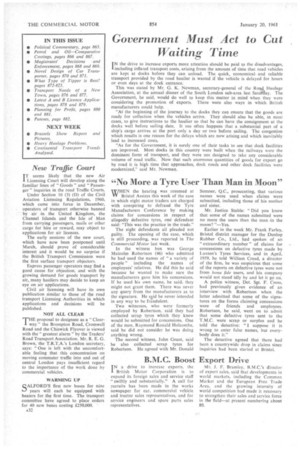"No More a Tyre User Than Man in Moon"
Page 34

If you've noticed an error in this article please click here to report it so we can fix it.
NVHEN the hearing was resumed at Bristol Assizes this week of the case in which eight motor traders are charged with conspiring to defraud the Tyre Manufacturers Conference by making claims for concessions in respect of allegedly defective tyres, one defendant said: "This was the practice in the trade."
The eight defendants all pleaded not guilty. The opening of the case, which is still proceeding, was reported in The Commercial Motor last week.
In the witness box was George Malcolm Robertson (46) who admitted he had used the names of "a variety of people" including the names of employees' relatives. He did this he said because he wanted to make sure the manufacturers gave him his concessions, If he used his own name, he said, they might not grant them. There was never any query from the manufacturers as to the signature. He said he never intended in any way to be fraudulent.
Two witnesses, who were formerly employed by Robertson, said they had collected scrap tyres which they knew would be submitted for concessions. One of the men, Raymond Ronald Holcombe, said he did not consider he was doing anything wrong.
The second witness, John Grant, said he also collected scrap tyres for Robertson. He agreed with Mr. Donald Sumner, Q.C., prosecuting, that various names were used when claims were submitted, including those of his mother and sister.
Mr. Justice Stable: " Did you know that some of the names submitted were no more the users than the man-in the moon? "—Yes.
Earlier in the week Mr. Frank Farley, Bristol district manager for the Dunlop Rubber Co., Ltd., had spoken of an "extraordinary number" of claims for concessions on defective tyres made by Luxton's Tyres Services, and in April, 1959, he told William Creed, a director of the firm, he was suspicious that some of the reports on defective tyres were not from bona fide users, and his company would not stand idly by and let it go on.
A police witness, Det. Sgt. F. Cross, had previously given evidence of an interview with Robertson when the latter admitted that some of the signatures on the forms claiming concessions were of friends and employees. Robertson, he said, went on to admit that some defective tyres sent to the T.M.C. were scrap or surplus and he told the detective: "I suppose it is wrong to enter false names, but everybody does it."
The detective agreed that there had been a countrywide drop in claims since inquiries had been started at Bristol.




















































































































